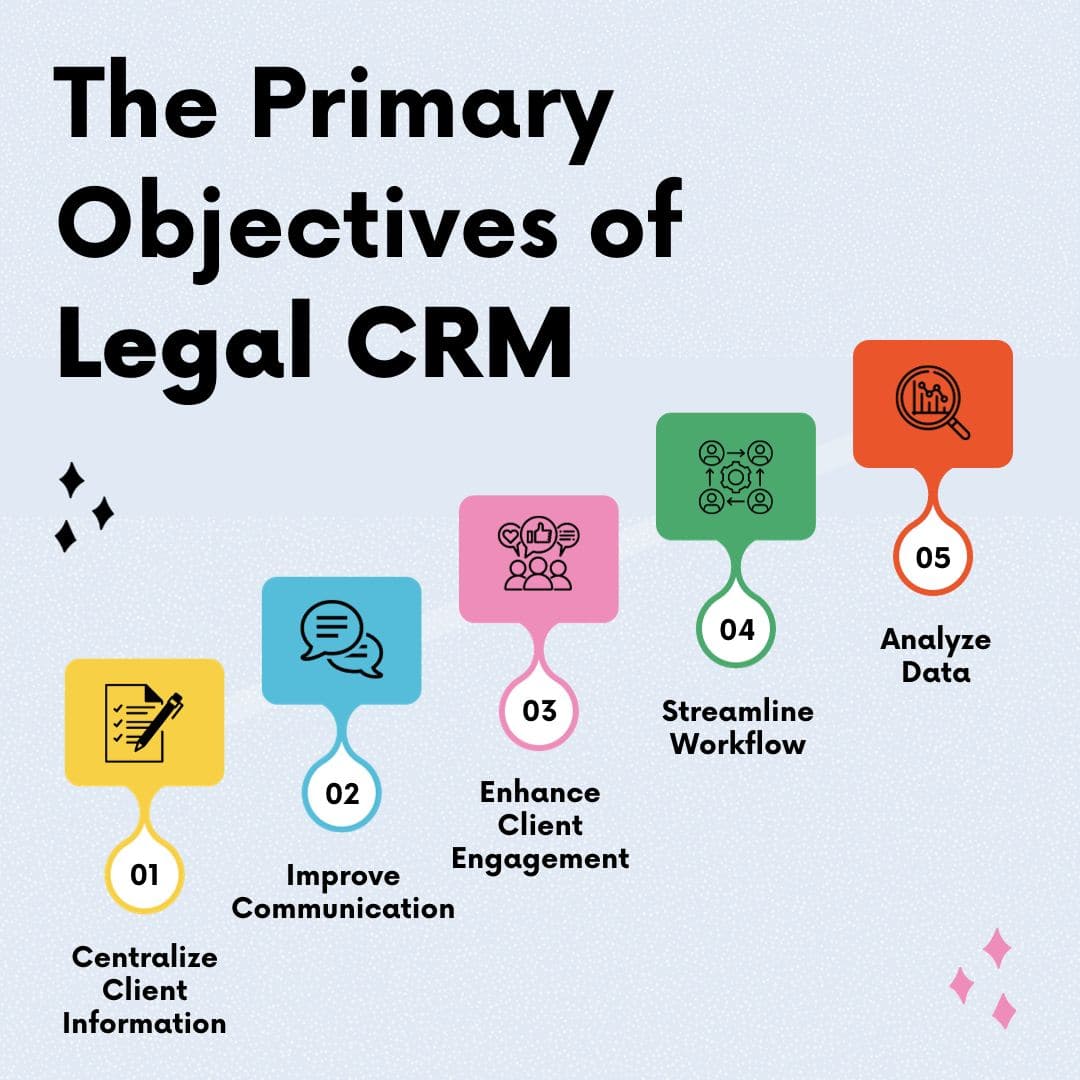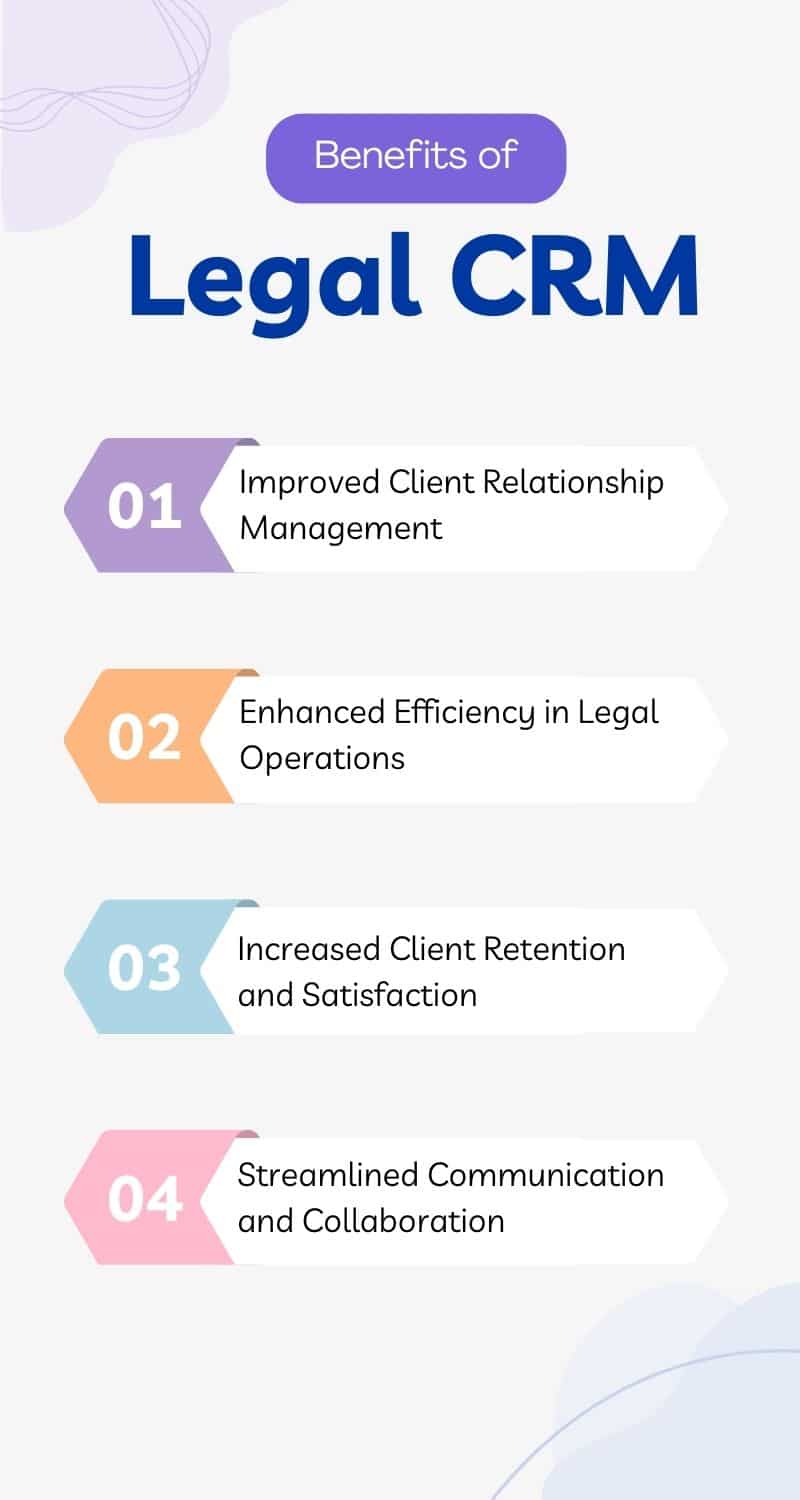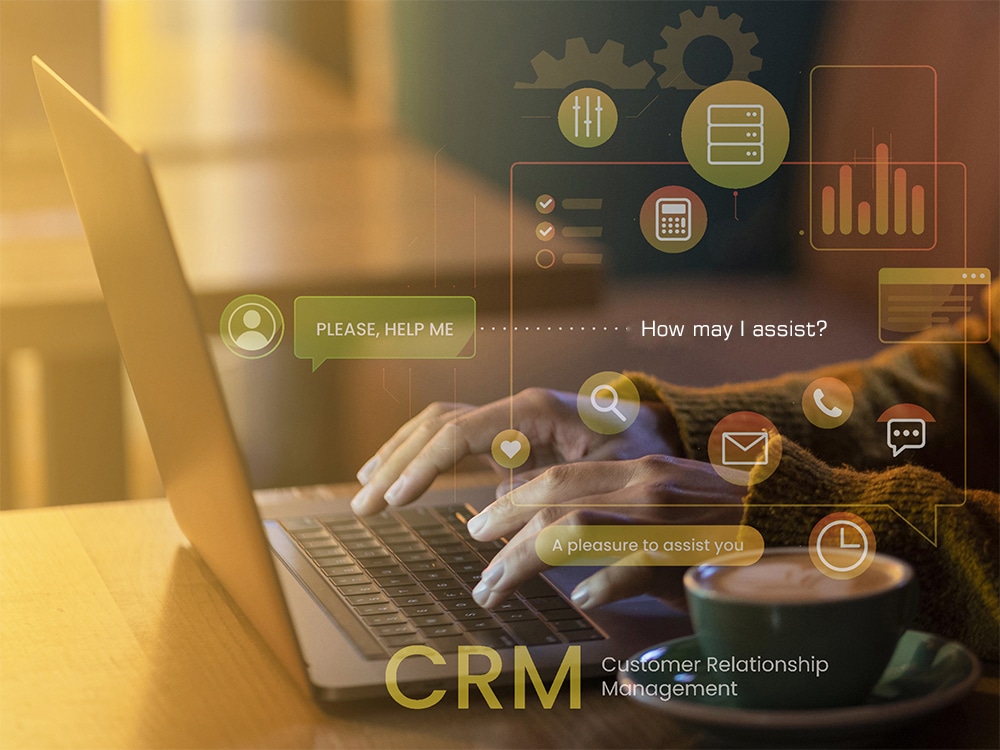Legal CRM
Legal CRM serves as the backbone of the legal industry. This specialized tool is about streamlining and enhancing how law firms, legal departments, and individual lawyers manage client relationships and interactions.
The Primary Objectives of Legal CRM are to:
1. Centralize Client Information:
2. Improve Communication:
3. Enhance Client Engagement:
4. Streamline Workflow:
5. Analyze Data:

Benefits of Legal CRM
1. Improved Client Relationship Management
2. Enhanced Efficiency in Legal Operations
3. Increased Client Retention and Satisfaction

4. Streamlined Communication and Collaboration
Key Features of Legal CRM
1. Contact and Client Database Management
This includes storing contact details, communication history, case-related information, and key notes.
Efficient contact management ensures you can easily access critical information when interacting with clients or colleagues, leading to more personalized and effective communication.
2. Case Management and Workflow Automation
For example, it can automate document generation, court deadline reminders, and task assignments. This feature helps reduce manual effort, minimize errors, and ensure that your legal operations run smoothly.
3. Document Management and Integration
You can securely store and manage case-related documents, contracts, pleadings, and correspondence within the CRM.
Integration with document management systems and cloud storage platforms ensures seamless document access, promoting collaboration and efficiency.
4. Task and Appointment Scheduling
You can plan appointments, establish reminders, and generate task lists. Calendar integration ensures that important dates, such as court appearances, deadlines, and client meetings, are never missed.
Task and appointment scheduling contribute to better time management and client service.
5. Reporting and Analytics
Analytics tools help identify trends, measure client satisfaction, and make data-driven decisions. These features support continuous improvement and informed decision-making within your legal practice.
By incorporating these key features, Legal CRM systems empower you to manage contacts, streamline workflows, access documents, optimize task scheduling, and leverage data analytics for more efficient and effective legal operations. These functionalities are critical for delivering high-quality legal services and maintaining client satisfaction.

1. Integration with Existing Legal Systems
Successful integration ensures seamless data exchange between the Legal CRM and other systems. It streamlines workflows, eliminates data silos, and enhances the overall efficiency of your practice. Ensuring compatibility and smooth integration is a critical step in the implementation process.
2. Data Migration and Security
To do this correctly, you must avoid losing or damaging any data during the move. Plus, since Legal CRM systems store sensitive client info, you need strong security measures to protect against unauthorized access and data breaches.
3. Training and User Adoption
Getting your team to embrace the CRM is just as important. You can make this happen by designing an easy-to-use interface and providing ongoing support and resources. When your staff sees the benefits and fully integrates the CRM into their daily work, you are on the right track.
In conclusion, implementing a Legal CRM is a complex process. It involves blending the system with your existing tools, moving data carefully with security in mind, and ensuring your team knows how to use it through training and support. A well-done implementation improves client relationships and makes your legal practice run more efficiently, leading to success.
Challenges and Considerations
1. Data Privacy and Security Concerns
When it comes to Legal CRM systems, nothing is more critical than ensuring the privacy and security of sensitive client data. Your law firm handles confidential information, and any mishandling or breach can have serious consequences.
To safeguard this data, Legal CRM systems should incorporate strong security measures like encryption, access controls, and regular security audits. Compliance with data privacy regulations, such as GDPR or HIPAA, is essential to avoid legal issues and maintain the trust your clients have in you.
2. Customization and Scalability
Scalability ensures the CRM can grow alongside your firm, accommodating more data and users as needed. When evaluating a Legal CRM’s flexibility and scalability, you ensure it aligns with your practice’s specific needs and growth plans.
3. Regulatory Compliance
The legal industry is heavily regulated, and Legal CRM systems must support these compliance requirements. You must ensure our CRM adheres to industry-specific regulations, such as attorney-client privilege rules and legal document retention policies.
If you are dealing with global clients, international data protection regulations should also be on your radar. Legal CRM vendors should provide tools and features to assist you in meeting these regulatory obligations.
Addressing challenges and considerations such as data privacy and security, customization, scalability, and regulatory compliance is crucial during the implementation and use of Legal CRM systems. By managing these concerns proactively, you are not only enhancing your operational efficiency but also upholding the ethical and legal standards of the legal profession.
Emerging Trends in Legal CRM
1. AI and Automation in CRM
AI (Artificial Intelligence) and automation are emerging as significant trends in Legal CRM.
AI-powered features like chatbots, predictive analytics, and natural language processing (NLP) are revolutionizing how you interact with clients and analyze data. Chatbots, for instance, provide round-the-clock support, handling routine inquiries and scheduling appointments to enhance client service.
Predictive analytics empowers you to foresee client needs and case outcomes. NLP technology accelerates the extraction of insights from legal documents and communications. These AI advancements enhance efficiency, elevate client engagement, and enable the delivery of more personalized services.
2. Mobile CRM Solutions for Lawyers
Mobile Legal CRM applications empower you to stay connected and productive, whether out of the office or in court. Retrieve client information, manage appointments, and collaborate with colleagues effortlessly via your smartphone or tablet.
This seamless accessibility ensures uninterrupted client service and responsiveness.
3. Cloud-Based Legal CRM
By opting for cloud-based CRM, your firm eliminates the need for on-site servers and trims IT maintenance costs. You can securely access data and collaborate, even when working remotely. The scalability of cloud solutions accommodates firms of all sizes, from solo practitioners to sizable legal organizations.
These emerging trends in Legal CRM, encompassing AI and automation, mobile solutions, and cloud-based platforms, are reshaping how you manage client relationships and operational efficiency. Staying attuned to these trends and considering their adoption positions your legal practice to remain competitive, provide exceptional client service, and adapt to the evolving demands of the legal industry.

Ethical Considerations in Legal CRM
1. Maintaining Attorney-Client Privilege
As you implement Legal CRM systems, ensuring that your technology doesn’t compromise this privilege is crucial. Your CRM platform should include strong security measures, access controls, and encryption to keep attorney-client communications and sensitive case-related information confidential.
Look for Legal CRM vendors who provide tools and features that align with your ethical obligations to protect client data.
2. Handling Sensitive Client Data
Conduct thorough risk assessments to identify potential vulnerabilities in your CRM systems and implement safeguards against data breaches or unauthorized access. Additionally, ensure you comply with data protection laws and regulations relevant to your jurisdiction.
This may involve obtaining client consent for data processing, providing clients with privacy notices, and adhering to data retention policies.
Integration with Other Legal Technologies
1. Integration with Document Management Systems
When your Legal CRM seamlessly integrates with DMS, it simplifies your access to documents directly from the CRM interface. You can swiftly retrieve case-related documents, share them with clients or colleagues, and ensure all necessary information is at your fingertips. This integration doesn’t just save you time; it reduces duplication of effort and enhances the security of your documents.
2. Collaboration with eDiscovery Tools
This integration supports a comprehensive approach to case management, ensuring that all aspects, including eDiscovery, are seamlessly coordinated.
Integrating your Legal CRM with other essential legal technologies, such as document management systems and eDiscovery tools, boosts the capabilities of your CRM system.
It promotes efficiency and effectiveness in legal operations, granting seamless access to critical information and resources. Ultimately, this empowers you to provide superior client service and achieve more favorable outcomes in your legal matters.
Future Outlook and Adoption of Legal CRM
1. Growth and Adoption Trends
More and more, law firms and legal professionals are recognizing the incredible value that CRM systems bring to the table. They streamline client relationships, optimize operations, and elevate the overall quality of service. As a result, you can expect to see increasing adoption rates throughout various segments of the legal industry, whether you are a solo practitioner, part of a large law firm, or working in an in-house legal department.
The Legal CRM market is set to expand further, with vendors offering specialized and tailored options to meet your diverse needs.
2. Benefits for Legal Professionals and Clients
Your clients will also benefit from the future adoption of Legal CRM systems. They will enjoy greater transparency and communication as you use CRM platforms to inform them about case progress, appointments, and critical milestones. They can look forward to more efficient and responsive service, resulting in increased satisfaction and trust in your legal representation.
